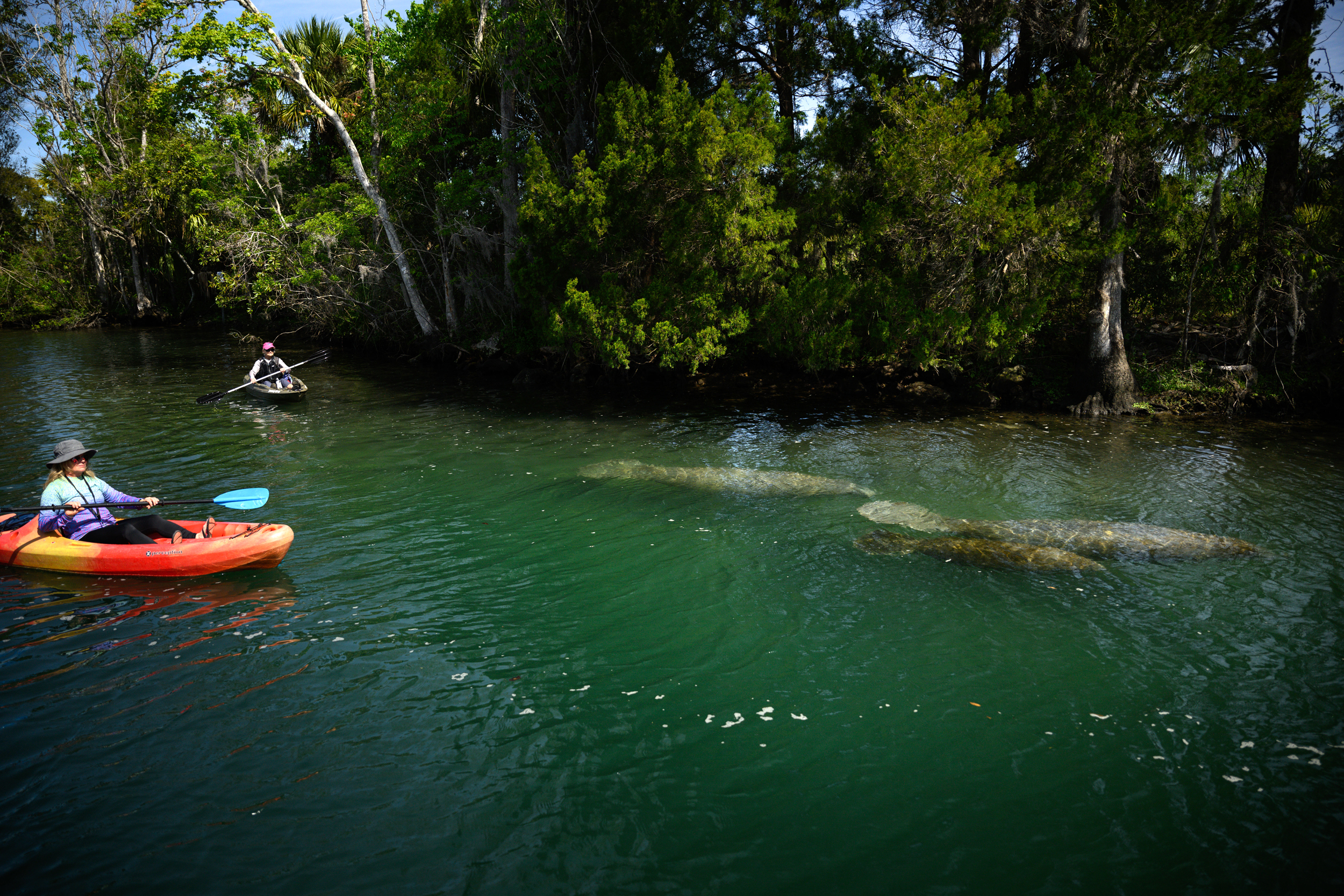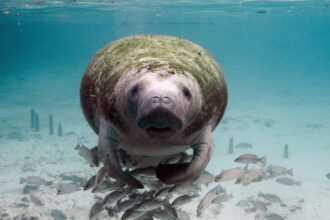Slightly more manatees died this year in Florida than in previous years, although the number was not as high as that in 2021 and 2022, when a record die-off prompted widespread alarm.
A total of 587 manatee mortalities have been recorded in the state through Nov. 7, according to the most recent numbers available from the Florida Fish and Wildlife Conservation Commission. By comparison 565 deaths were documented in 2024 and 555 in 2023.
Nearly 2,000 manatees died in Florida between 2021 and 2022, a two-year record. Conservation groups then said the mortalities represented more than 20 percent of the state’s population. The calamity prompted the U.S. Fish and Wildlife Service and Florida Fish and Wildlife Conservation Commission to take the unprecedented step of providing supplemental lettuce for starving manatees in the 156-mile Indian River Lagoon, a crucial manatee habitat on the Atlantic coast. Water quality problems have led to a widespread loss of seagrass in the lagoon.
“It’s concerning, the uptick in mortalities,” Pat Rose, executive director of the Save the Manatee Club, said of this year’s numbers. “But it’s not a runaway crisis like we had before.”
The manatees continue to face multiple threats, he said. In addition to the ongoing water quality problems and seagrass losses, the animals are vulnerable to boat strikes. Meanwhile an increase in the number of baby manatee mortalities indicates females now are better able to procreate. During the die-off the females were so emaciated they could not even get pregnant, Rose said.
“So it’s a good and bad thing,” he said. “It’s way better than when they basically couldn’t deliver the babies.”
Rose also worries about the cold-sensitive manatees as power companies transition away from fossil fuels because of climate change, jeopardizing the artificially warm waters around power plants. He said more must be done to restore the state’s fragile springs, where water temperatures remain constant year-round, and also to manage the rampant growth and development and nutrient pollution at the heart of many of the water quality problems in Florida.
A federal judge ordered the state in April to develop a plan for addressing the nutrient pollution in the Indian River Lagoon, ruling that Florida was in violation of the Endangered Species Act. The lawsuit, filed by the conservation group Bear Warriors United, accused the Florida Department of Environmental Protection of unlawfully “taking” manatees under the Endangered Species Act by promulgating wastewater discharge regulations that failed to control the flows of pollution from wastewater treatment plants and septic tanks.
The Florida Department of Environmental Protection appealed the judge’s ruling. The agency did not immediately respond to a request for comment but said previously that it disagreed with the decision and that the state had put nearly $747 million in recent years toward projects designed to remove 2.3 million pounds of nitrogen and 418,000 pounds of phosphorus annually in the Indian River Lagoon region.
Meanwhile the U.S. Fish and Wildlife Service proposed in January that the Florida manatee should retain its status under the Endangered Species Act as threatened, despite widespread outcry over the animal’s downlisting in 2017 from endangered. The federal agency said the Florida manatee’s population had stabilized at between 8,350 and 11,730 animals, although the proposal called for the Antillean manatee, a separate subspecies, to be listed as endangered. As few as 1,200 manatees were estimated in Florida in the early 1990s. The U.S. Fish and Wildlife Service did not immediately respond to a request for comment.
Katrina Shadix, executive director of Bear Warriors United, said her group would continue to push for rescue efforts such as a bio assessment team, aimed at monitoring the manatees’ health before they start dying.
“To personally experience the death of manatees and the contamination of a wonderful, unique water body is what jolted me into action. You always say someone needs to do something, and no one was doing anything about it. And so being a second-generation native Floridian I took that step,” she said. “I will continue to fight for manatees until my death, because this is nuts. It’s outrageous what has been allowed to happen to manatees.”
About This Story
Perhaps you noticed: This story, like all the news we publish, is free to read. That’s because Inside Climate News is a 501c3 nonprofit organization. We do not charge a subscription fee, lock our news behind a paywall, or clutter our website with ads. We make our news on climate and the environment freely available to you and anyone who wants it.
That’s not all. We also share our news for free with scores of other media organizations around the country. Many of them can’t afford to do environmental journalism of their own. We’ve built bureaus from coast to coast to report local stories, collaborate with local newsrooms and co-publish articles so that this vital work is shared as widely as possible.
Two of us launched ICN in 2007. Six years later we earned a Pulitzer Prize for National Reporting, and now we run the oldest and largest dedicated climate newsroom in the nation. We tell the story in all its complexity. We hold polluters accountable. We expose environmental injustice. We debunk misinformation. We scrutinize solutions and inspire action.
Donations from readers like you fund every aspect of what we do. If you don’t already, will you support our ongoing work, our reporting on the biggest crisis facing our planet, and help us reach even more readers in more places?
Please take a moment to make a tax-deductible donation. Every one of them makes a difference.
Thank you,













